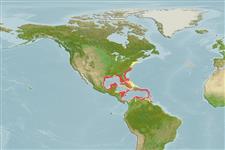Common names from other countries
>
Perciformes/Serranoidei (Groupers) >
Epinephelidae (Groupers)
Etymology: Mycteroperca: Greek, mykter, -eros = nose + Greek, perke = perch (Ref. 45335); phenax: Most probably a misspelling of the specific epithet because based on Labrus guaza Loefling 1758:104 (type locality: Cumana, Venezuela) (see CofF)..
More on authors: Jordan & Swain.
Environment: milieu / climate zone / depth range / distribution range
Sinh thái học
Biển; Thuộc về nước lợ Cùng sống ở rạn san hô; Ở đại duơng, biển (Ref. 51243); Mức độ sâu 30 - 100 m (Ref. 5222), usually 30 - 100 m (Ref. 5222). Subtropical; 41°N - 8°N, 98°W - 25°W (Ref. 5222)
Western Central Atlantic: Gulf of Mexico and east coast of US from North Carolina to Key West and along the southern shore of the Caribbean Sea. Juveniles are occasionally found as far north as Massachusetts.
Length at first maturity / Bộ gần gũi / Khối lượng (Trọng lượng) / Age
Maturity: Lm 33.2 range ? - ? cm
Max length : 107 cm TL con đực/không giới tính; (Ref. 89707); common length : 30.0 cm TL con đực/không giới tính; (Ref. 3708); Khối lượng cực đại được công bố: 14.2 kg (Ref. 40637); Tuổi cực đại được báo cáo: 21 các năm (Ref. 6846)
Các tia vây lưng cứng (tổng cộng) : 11; Các vây lưng mềm (tổng cộng) : 16 - 18; Tia cứng vây hậu môn: 3; Tia mềm vây hậu môn: 10 - 12. Distinguished by the following characteristics: four color patterns, first is brown phase with head and body pale brown covered with small reddish brown spots that extend onto median fins, second is cat's paw phase with pale brown body color with dorsolateral parts of body having several clusters of dark brown spots resembling the paw print of a cat, third is with large adults with grey-head phase with the rear two-thirds of the body dark, head and body anterior to the 6th dorsal-fin spine in silvery grey with dark reticulations and fourth is bicoloured phase with pale brown anteriorly and abruptly dark chocolate brown posteriorly; depth of body contained 3.0-3.4 times in SL; head length 2.6-3.0 times in SL; convex interorbital area; angular preopercle, angle with distinct bony lobe; serrate interopercle and subopercle; posterior nostrils of adults 2-4 times larger than anterior ones (Ref. 89707).
Found over ledges and high-relief rocky bottoms in the eastern Gulf of Mexico; at low-profile bottoms at depths of 30 to 100 m in North Carolina; this species was the most abundant grouper in areas of living Oculina coral formations at depths of 70 to 100 m off the east coast of Florida. This species apparently moved inshore when bottom temperature fell below 8.6°C. Juveniles found in shallow water at jetties and in mangrove areas.
Life cycle and mating behavior
Maturities | Sự tái sinh sản | Spawnings | Egg(s) | Fecundities | Ấu trùng
Heemstra, P.C. and J.E. Randall, 1993. FAO Species Catalogue. Vol. 16. Groupers of the world (family Serranidae, subfamily Epinephelinae). An annotated and illustrated catalogue of the grouper, rockcod, hind, coral grouper and lyretail species known to date. Rome: FAO. FAO Fish. Synop. 125(16):382 p. (Ref. 5222)
IUCN Red List Status (Ref. 130435)
CITES (Ref. 128078)
Not Evaluated
Threat to humans
Harmless
Human uses
Các nghề cá: tính thương mại cao; cá để chơi: đúng
Các công cụ
Special reports
Download XML
Các nguồn internet
Estimates based on models
Preferred temperature (Ref.
115969): 20.7 - 27.5, mean 24.4 (based on 130 cells).
Phylogenetic diversity index (Ref.
82804): PD
50 = 0.5000 [Uniqueness, from 0.5 = low to 2.0 = high].
Bayesian length-weight: a=0.00933 (0.00429 - 0.02028), b=3.04 (2.87 - 3.21), in cm Total Length, based on LWR estimates for this Genus-body shape (Ref.
93245).
Mức dinh dưỡng (Ref.
69278): 4.5 ±0.0 se; based on diet studies.
Thích nghi nhanh (Ref.
120179): thấp, thời gian nhân đôi của chủng quần tối thiểu là 4.5 - 14 năm (K=0.09-0.17; tmax=21).
Fishing Vulnerability (Ref.
59153): High to very high vulnerability (69 of 100).
Climate Vulnerability (Ref.
125649): Moderate to high vulnerability (52 of 100).
